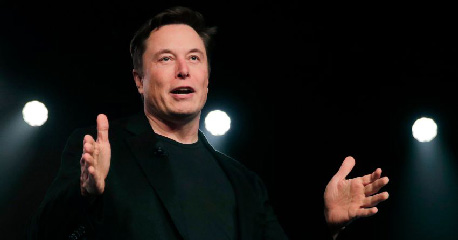
'Bad timing': Elon Musk's company can no longer fund its vital service to Ukraine
WashingtonCNN —
Since they first started arriving in Ukraine last spring, the Starlink satellite internet terminals made by Elon Musk’s SpaceX have been a vital source of communication for Ukraine’s military, allowing it to fight and stay connected even as cellular phone and internet networks have been destroyed in its war with Russia.
So far roughly 20,000 Starlink satellite units have been donated to Ukraine, with Musk tweeting on Friday the “operation has cost SpaceX $80 million and will exceed $100 million by the end of the year.”
But those charitable contributions could be coming to an end, as SpaceX has warned the Pentagon that it may stop funding the service in Ukraine unless the US military kicks in tens of millions of dollars per month.
Documents obtained by CNN show that last month Musk’s SpaceX sent a letter to the Pentagon saying it can no longer continue to fund the Starlink service as it has. The letter also requested that the Pentagon take over funding for Ukraine’s government and military use of Starlink, which SpaceX claims would cost more than $120 million for the rest of the year and could cost close to $400 million for the next 12 months.
“We are not in a position to further donate terminals to Ukraine, or fund the existing terminals for an indefinite period of time,” SpaceX’s director of government sales wrote to the Pentagon in the September letter.
Among the SpaceX documents sent to the Pentagon and seen by CNN is a previously unreported direct request made to Musk in July by the Ukrainian military’s commanding general, General Valerii Zaluzhniy, for almost 8,000 more Starlink terminals.
In a separate cover letter to the Pentagon, an outside consultant working for SpaceX wrote, “SpaceX faces terribly difficult decisions here. I do not think they have the financial ability to provide any additional terminals or service as requested by General Zaluzhniy.”
The documents, which have not been previously reported, provide a rare breakdown of SpaceX’s own internal numbers on Starlink, detailing the costs and payments associated with the thousands of terminals in Ukraine. They also shed new light on behind-the-scenes negotiations that have provided millions of dollars in communications hardware and services to Ukraine at little cost to Kyiv.
Reports of outages
The letters come amid recent reports of wide-ranging Starlink outages as Ukrainian troops attempt to retake ground occupied by Russia in the eastern and southern parts of the country.
Sources familiar with the outages said they suddenly affected the entire frontline as it stood on September 30. “That has affected every effort of the Ukrainians to push past that front,” said one person familiar with the outages who spoke to CNN on condition of anonymity to discuss sensitive conversations. “Starlink is the main way units on the battlefield have to communicate.”
There was no warning to Ukrainian forces, a second person said, adding that now when Ukraine liberates an area a request has to be made for Starlink services to be turned on.
The Financial Times first reported the outages which resulted in a “catastrophic” loss of communication, a senior Ukrainian official said. In a tweet responding to the article, Musk didn’t dispute the outage, saying that what is happening on the battlefield is classified.
SpaceX’s suggestion it will stop funding Starlink also comes amid rising concern in Ukraine over Musk’s allegiance. Musk recently tweeted a controversial peace plan that would have Ukraine give up Crimea and control over the eastern Luhansk and Donetsk regions.
After Ukrainian President Volodymyr Zelensky raised the question of who Musk sides with, he responded that he “still very much support[s] Ukraine” but fears “massive escalation.”
Musk also argued privately last month that Ukraine doesn’t want peace negotiations right now and that if they went along with his plan, “Russia would accept those terms,” according to a person who heard them.
“Ukraine knows that its current government and wartime efforts are totally dependent on Starlink,” the person familiar with the discussions said. “The decision to keep Starlink running or not rests entirely in the hands of one man. That’s Elon Musk. He hasn’t been elected, no one decided to give him that power. He has it because of the technology and the company he built.”
On Tuesday Musk denied a report he has spoken to Putin directly about Ukraine. On Thursday, when a Ukrainian minister tweeted that Starlink is essential to Ukraine’s infrastructure, Musk replied: “You’re most welcome. Glad to support Ukraine.”
“The gall to look like heroes”
More than seven months into the war, it’s hard to overstate the impact Starlink has had in Ukraine. The government in Kyiv, Ukrainian troops as well and NGOs and civilians have relied on the nimble, compact and easy-to-use units created by SpaceX. It’s not only used for voice and electronic communication but to help fly drones and send back video to correct artillery fire.
CNN has seen it used at numerous Ukrainian bases.
Jim Watson/AFP/Getty Images
“Starlink has been absolutely essential because the Russians have targeted the Ukrainian communications infrastructure,” said Dimitri Alperovitch, co-founder of the Silverado Policy Accelerator, a think tank. “Without that they’d be really operating in the blind in many cases.”
Though Musk has received widespread acclaim and thanks for responding to requests for Starlink service to Ukraine right as the war was starting, in reality, the vast majority of the 20,000 terminals have received full or partial funding from outside sources, including the US government, the UK and Poland, according to the SpaceX letter to the Pentagon.
SpaceX’s request that the US military foot the bill has rankled top brass at the Pentagon, with one senior defense official telling CNN that SpaceX has “the gall to look like heroes” while having others pay so much and now presenting them with a bill for tens of millions per month.
According to the SpaceX figures shared with the Pentagon, about 85% of the 20,000 terminals in Ukraine were paid – or partially paid – for by countries like the US and Poland or other entities. Those entities also paid for about 30% of the internet connectivity, which SpaceX says costs $4,500 each month per unit for the most advanced service. (Over the weekend, Musk tweeted there are around 25,000 terminals in Ukraine.)
In his July letter to Musk, Ukraine’s commander-in-chief, Gen. Zaluzhniy, praised the Starlink units’ “exceptional utility” and said some 4,000 terminals had been deployed by the military. However, around 500 terminals per month are destroyed in the fighting, Zaluzhniy said, before asking for 6,200 more terminals for the Ukrainian military and intelligence services and 500 per month going forward to offset the losses.
SpaceX said they responded by asking Zaluzhniy to instead take up his request to the Department of Defense.
On September 8 the senior director of government sales for SpaceX wrote the Pentagon saying the costs have gotten too high, approaching $100 million. The official asked the Department of Defense to pick up Ukraine’s new request as well as ongoing service costs, totaling $124 million for the remainder of 2022.
Those costs, according to the senior defense official, would reach almost $380 million for a full year.
SpaceX declined repeated requests for comment on both the outages and their recent request to the Pentagon. A lawyer for Musk did not reply to a request for comment. Defense Department spokesman Bob Ditchey told CNN, “The Department continues to work with industry to explore solutions for Ukraine’s armed forces as they repel Russia’s brutal and unprovoked aggression. We do not have anything else to add at this time.”
Breaking down the costs
Early US support for Starlink came via the United States Agency for International Development (USAID) which according to the Washington Post spent roughly $3 million on hardware and services in Ukraine. The largest single contributor of terminals, according to the newly obtained documents, is Poland with payment for almost 9,000 individual terminals.
The US has provided almost 1,700 terminals. Other contributors include the UK, NGOs and crowdfunding.
The far more expensive part, however, is the ongoing connectivity. SpaceX says it has paid for about 70% of the service provided to Ukraine and claims to have offered that highest level – $4,500 a month – to all terminals in Ukraine despite the majority only having signed on for the cheaper $500 per month service.
The terminals themselves cost $1500 and $2500 for the two models sent to Ukraine, the documents say, while consumer models on Starlink’s website are far cheaper and service in Ukraine is just $60 per month.
That’s just 1.3% of the service rate SpaceX says it needs the Pentagon to start paying.
“You could say he’s trying to get money from the government or just trying to say ‘I don’t want to be part of this anymore,’” said the person familiar with Ukraine’s requests for Starlink. Given the recent outages and Musk’s reputation for being unpredictable, “Feelings are running really high on the Ukrainian side,” this person said.
Musk is the biggest shareholder of the privately-held SpaceX. In May, SpaceX disclosed that its valuation had risen to $127 billion and it has raised $2 billion this year, CNBC reported.
Last week, Musk faced a barrage of criticism on Twitter – including from Ukrainian President Volodymyr Zelensky – after presenting in a series of tweets his peace plan to end the war. It would include giving Crimea to Russia and re-do referenda, supervised by the United Nations this time, in the four regions Russia recently illegally annexed.
It echoed comments he’d made last month at an exclusive closed-door conference in Aspen, Colorado called “The Weekend,” at which Musk told a room full of attendees that Ukraine should seek peace now because they’ve had recent victories.
“This is the time to do it. They don’t want to do it, that’s for sure. But this is the time to do it,” he said, according to a person in the room. “Everyone wants to seek peace when they’re losing but they don’t want to seek peace when they’re winning. For now.”




